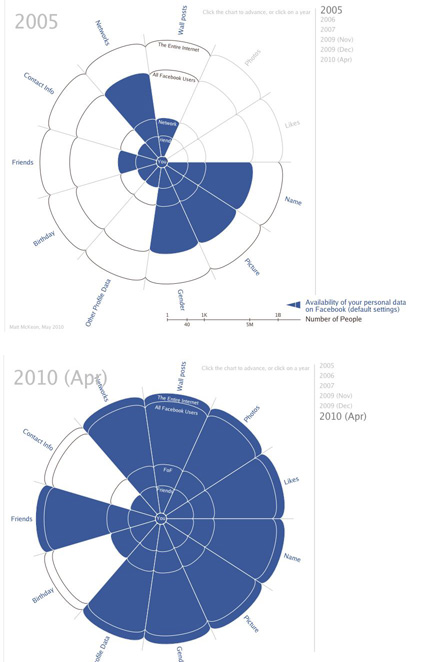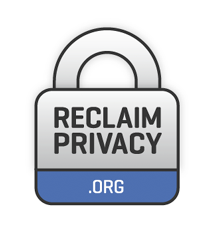Home | You searched for "facebook"
Latest Posts
We need a Facebook Privacy Tool that isn’t written by Facebook. Currently, to effectively manage your privacy on Facebook, you’ve got to alter 50 settings with more than 170 options.
Maybe that is why Facebook’s CEO Mark Zuckerberg confessed on Monday that the quickly expanding social network had “missed the mark” when it comes to its complex privacy controls — and pledged to do better.
Can you imagine keeping up with all your Privacy Settings every time Facbook makes a change? Until Facebook figures it out, a new Privacy Awareness Group—ReclaimPrivacy.org, has developed a tool that scans your Facebook privacy settings to tell you how secure your personal information is. The tool comes in the form of a bookmark for your web browser. Start by dragging the bookmark from the website above to your bookmarks/favorites. Then, log into your Facebook account, go to the privacy settings screen and click on the bookmark. After the tool scans your privacy settings in six areas—Facebook’s Instant Personalization feature; your personal data; contact information; friends, tags, and connections; what your friends can share about you; and whether applications can leak your personal data—it tells you what areas are secure and where you may want to consider tweaking your settings.
Posted in Identity Theft Prevention, Online Privacy by Identity Theft Speaker John Sileo.
Tags: Facebook, Facebook Privacy Tool, Identity Theft Prevention, John Sileo, Mark Zuckerberg, Privacy, Privacy Settings, ReclaimPrivacy.org, Social Networking Expert
Facebook has announced a new security feature that focuses on keeping users’ information safe from hackers attempting to gain access into your account.
The feature was announced last Thursday, and is similar to how secured banking sites work — they only let you access the site from approved computers. If you are attempting to log onto your Facebook account from an unknown computer, device, or location, Facebook will notify you via email and lock down your account in case it is under attack. To regain access, you will have to follow the link in the email which will lead you through a security check to verify your identity. They will ask you a few security questions and have you acknowledge that it was in fact YOU (or if it wasn’t you, then you notify Facebook at this point) trying to access your account.
Posted in Identity Theft Prevention, Online Privacy by Identity Theft Speaker John Sileo.
Tags: CNN, Facebook, identity theft expert, Information Control, John Sileo, Privacy, Social Networking Speaker
You are the frog and Facebook is the slowly boiling water. Here is an excellent visual representation of how your default Facebook Privacy Settings have changed over the years. If you want to see the interactive version, click on the picture below and it will take you to the website where you can click on the image year by year and watch your privacy erode. Essentially, the amount of blue on the chart is how much of your information Facebook is sharing with the outside world. Can you say boil the frog slowly?
 I found this map in a revealing article on Facebook’s founder, Mark Zuckerburg published by The Register (U.K.).
I found this map in a revealing article on Facebook’s founder, Mark Zuckerburg published by The Register (U.K.).
The first source for the disturbing comments attributed to Zuckerburg were pointed out to me by my lead researcher, Liz. This article on Mr. Zuckerburg calling his first Facebook users dumbf*&%#$. appeared on Gawker.com.
Posted in Online Privacy by Identity Theft Speaker John Sileo.
Tags: "Delete Facebook", "How do I delete my Facebook account", "Mark Zuckerburg", Delete, Facebook, identity theft expert, Identity Theft Speaker, John Sileo, Privacy
[youtube http://www.youtube.com/watch?v=cB7_JLdayv4&rel=0]
How do I delete my Facebook account?
I get asked how to delete a Facebook account nearly every day; whether it’s at my speeches, by my clients, or by my friends and family. It used to be that people no longer wanted the mundane information overload that Facebook promotes. But now they are looking at it from a privacy perspective – they no longer want their thoughts, pictures, and videos shared indiscriminately with people they don’t know.
The defections have been sparked by Facebook’s continuing march to sell your private information (with only your implied consent, i.e., simply by using Facebook, you agree to their terms) with an ever widening circle of people who are NOT YOUR FRIENDS (advertisers, data miners, and unfortunately, identity thieves). Many of the corporations I speak for have me include a component on safe social networking because the information their employees are posting (personally or professionally) are damaging their corporate brand and profits either through data leakage or as a beach-head for social engineering and other types of fraud.
Posted in Online Privacy, Social Media Privacy by Identity Theft Speaker John Sileo.
Tags: "Deactivate Facebook", "Delete Facebok", "Delete Facebook Account", "Delete Facebook", "Deleting Facebook", "Facebook Account", "Facebook Profile", "Facebook Speaker", "How do I delete my Facebook account", "How do I", "How to", CNN, Facebok, Facebook, Online/Social Media Privacy, social networking
As of last week, Facebook has added two new ways that you can connect to things you care about. The problem with these changes is that they takes away the user’s ability to control who can see these connections. The first change made is the addition of Community Pages described by Facebook:
Community Pages are a new type of Facebook Page dedicated to a topic or experience that is owned collectively by the community connected to it. Just like official Pages for businesses, organizations, and public figures, Community Pages let you connect with others who share similar interests and experiences.
The addition of these new pages mean that certain parts of your profile, “including your current city, hometown, education and work, and likes and interests” will now be transformed into “connections,” meaning that they will be shared publicly. If you don’t want these parts of your profile to be made public, your only option is to delete them.
Posted in Identity Theft Prevention, Online Privacy by Identity Theft Speaker John Sileo.
Tags: Facebook, Facebook Changes, Facebook Expert, facebook privacy, John Sileo, Privacy, Privacy Facebook, safety, social networking
Young job-seekers are hiding their Facebook pages.
In today’s economic climate, more and more individuals are searching for jobs. Many job-seekers are just beginning to realize that managers looking to hire them can easily Google their name to find Facebook profiles, tweet history and vast quantities of online information that they would probably rather keep a bit more private. This is even more prevalent with recent college graduates who are entering the job market for the first time. With tough competition from so many qualified candidates, employers are turning to Facebook to help them sift through resumes. While some profiles are innocent, many have pictures, posts, and more that could possibly disqualify them from getting a job before they even walk into the interview. A new article by CNN discusses how more and more job-seekers are choosing to hide their Facebook profiles by changing their names (assuming an Alias, in spy terms) in order to keep a clean digital image of themselves on the web.
Posted in Identity Theft Prevention, Online Privacy by Identity Theft Speaker John Sileo.
Tags: Facebook, Facebook Expert, facebook privacy, John Sileo, Privacy, Privacy Facebook, safety, social networking, Social Networking Speaker
 The New York Times recently published an article that discusses the severe changes Facebook has made to privacy settings. This is the last post on these changes and each post gives you details on how to manage these new settings so that you can gradually accumulate your Facebook Privacy.
The New York Times recently published an article that discusses the severe changes Facebook has made to privacy settings. This is the last post on these changes and each post gives you details on how to manage these new settings so that you can gradually accumulate your Facebook Privacy.
What Can Google See? (Keep Your Data Off the Search Engines)
When you visit Facebook’s Search Settings page, a warning message pops up. Apparently, Facebook wants to clear the air about what info is being indexed by Google. The message reads:
There have been misleading rumors recently about Facebook indexing all your information on Google. This is not true. Facebook created public search listings in 2007 to enable people to search for your name and see a link to your Facebook profile. They will still only see a basic set of information.
Posted in Identity Theft Prevention, Online Privacy by Identity Theft Speaker John Sileo.
Tags: Facebook, Facebook Expert, facebook privacy, Google, John Sileo, Privacy, Privacy Facebook, safety, social networking
 The New York Times recently published an article that discusses the severe changes Facebook has made to privacy settings. This is the second post on these changes and each post will give you details on how to manage these new settings so that you can gradually accumulate your Facebook Privacy.
The New York Times recently published an article that discusses the severe changes Facebook has made to privacy settings. This is the second post on these changes and each post will give you details on how to manage these new settings so that you can gradually accumulate your Facebook Privacy.
Who Can See Your Personal Info?
Facebook has a section of your profile called “personal info,” but it only includes your interests, activities, and favorites. Other arguably more personal information is not encompassed by the “personal info” setting on Facebook’s Privacy Settings page. That other information includes things like your birthday, your religious and political views, and your relationship status.
After last month’s privacy changes, Facebook set the new defaults for this other information to viewable by either “Everyone” (for family and relationships, aka relationship status) or to “Friends of Friends” (birthday, religious and political views). Depending on your own preferences, you can update each of these fields as you see fit. However, we would bet that many will want to set these to “Only Friends” as well. To do so:
Posted in Identity Theft Prevention, Online Privacy by Identity Theft Speaker John Sileo.
Tags: Facebook, Facebook Expert, facebook privacy, John Sileo, Privacy, Privacy Facebook, safety, social networking
 The New York Times recently published an article that discusses the severe changes Facebook has made to privacy settings. Each post will give you details on how to manage these new settings and I will break these three topics up so that you can gradually accumulate your Facebook Privacy.
The New York Times recently published an article that discusses the severe changes Facebook has made to privacy settings. Each post will give you details on how to manage these new settings and I will break these three topics up so that you can gradually accumulate your Facebook Privacy.
Who Can See The Things You Share? (Status Updates, Photo, Videos, etc.)
Probably the most critical of the privacy changes was the change made to status updates. Although there’s now a button beneath the status update field that lets you select who can view any particular update, the new Facebook default for this setting is “Everyone.” And by everyone, they mean everyone.
If you accepted the new recommended settings then you voluntarily gave Facebook the right to share the information about the items you post with any user or application on the site. Depending on your search settings, you may have also given Facebook the right to share that information with search engines, too.
Posted in Identity Theft Prevention, Online Privacy by Identity Theft Speaker John Sileo.
Tags: Facebook, Facebook Expert, facebook privacy, John Sileo, Privacy, Privacy Facebook, safety, social networking







 The New York Times recently published an article that discusses the severe changes Facebook has made to privacy settings. This is the last post on these changes and each post gives you details on how to manage these new settings so that you can gradually accumulate your Facebook Privacy.
The New York Times recently published an article that discusses the severe changes Facebook has made to privacy settings. This is the last post on these changes and each post gives you details on how to manage these new settings so that you can gradually accumulate your Facebook Privacy.







